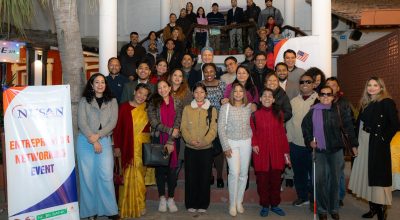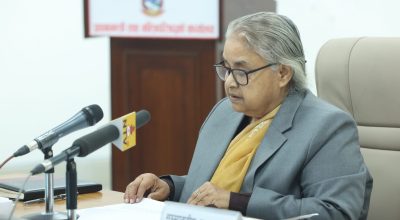
NEW YORK – Climate change is undoubtedly the defining challenge of our time, but its effects are not equally distributed. In both developed and developing countries, environmental degradation disproportionately affects communities marginalized because of race, ethnicity, religion, and poverty. More often than not, these communities are already confronting systemic inequalities such as water scarcity and greater exposure to pollution and extreme weather events – all of which are exacerbated by the climate crisis.
It is a reality with which I am intimately familiar. As a child, my family had a farm on Dominica, a small Caribbean island state that faces the threat of hurricanes each year. One tropical storm could knock out power grids and wipe out entire harvests, destroying local livelihoods.
According to the World Bank, climate-related disasters push 26 million people into poverty annually. And because the world’s poorest people often depend on agriculture – a sector highly dependent on favorable weather conditions – to support themselves, they urgently need access to technical, financial, and institutional resources to prepare for and respond to ever more frequent and intense extreme weather events.
Given its capacity to innovate climate solutions, the technology sector could provide the tools we need to understand, mitigate, and even reverse the damaging effects of global warming. In fact, addressing longstanding environmental injustices requires these companies to put the newest and most effective technologies into the hands of those on the front lines of the climate crisis.
Tools that harness the power of artificial intelligence, in particular, could offer unprecedented access to accurate information and prediction, enabling communities to learn from and adapt to climate challenges in real time. The IBM Sustainability Accelerator, which we launched in 2022, is at the forefront of this effort, supporting the development and scaling of projects such as the Deltares Aquality App, an AI-powered tool that helps farmers assess and improve water quality. As a result, farmers can grow crops more sustainably, prevent runoff pollution, and protect biodiversity.
Consider also the challenges that smallholder farmers face, such as rising costs, the difficulty of competing with larger producers that have better tools and technology, and, of course, the devastating effects of climate change on biodiversity and weather patterns. Accurate information, especially about soil conditions and water availability, can help them address these issues, but has historically been hard to obtain.
One could imagine regional officials in a developing country deploying a machine learning algorithm to forecast future population growth and corresponding change in energy demand using temporal and spatial data. With this forecasting model, policymakers could optimize the country’s energy network, redirecting supply to where it will be needed most. That is also something that we are supporting today.
Developing AI-powered mobile apps and virtual assistants, and making them widely available, promotes equitable access to data and technical insights. With highly accurate weather forecasting, advanced agronomy techniques, and carbon-footprint calculations, as well as other predictions generated by AI, smallholder farmers can build greater climate resilience and boost both production and income by adapting to changing conditions more quickly and managing crops more sustainably.
At the same time, simply handing over these tools to disadvantaged communities will not solve the problem – apps alone are not an antidote to climate injustice. To implement AI-based technology successfully, tech companies must be willing to share knowledge with users, including instructions on how to take measurements that will yield data. They must build in the ability for users to collaborate independently with one another, and solicit feedback from farmers and other users. To that end, an AI chatbot that automates question-and-answer exchanges could help minimize user-training challenges while democratizing access to information. As companies develop AI solutions, we also need to support local tech firms and app developers, as they are best positioned to put these tools to use.
Beyond increasing access to new AI-powered tools, the tech community, together with NGOs, governments, and international agencies, can help build an equitable, resilient future for disenfranchised communities by providing training in the technical skills and knowledge required for green jobs. As the transition to a low-carbon global economy accelerates, demand for so-called “green skills” is projected to outstrip supply. Preparing workers for the jobs of the future, in combination with the widespread adoption of new technologies, will strengthen climate resilience, especially in developing economies.
All of us – individuals, corporations, organizations, and governments – share the responsibility to address growing environmental threats. Tech firms, in particular, must channel more resources to combat global warming. That means investing in the development and implementation of AI tools and ensuring that those in the greatest need can access them. Finding climate solutions – and achieving environmental justice – depends on the private sector mobilizing its expertise for the greater good.
Justina Nixon-Saintil is Vice President and Chief Impact Officer at IBM.
Copyright: Project Syndicate, 2023.
www.project-syndicate.org
















